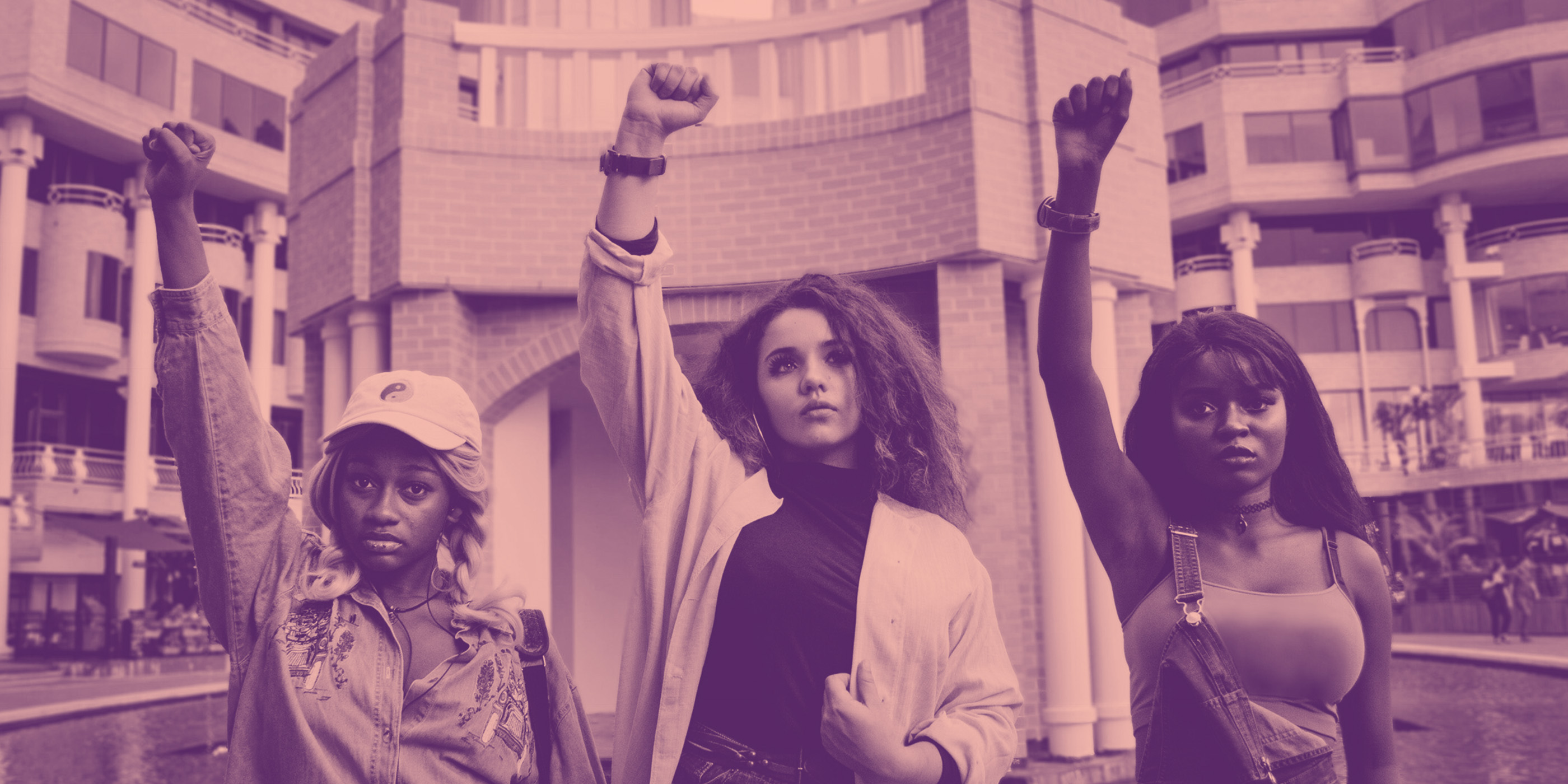To End Systemic Racism, Ensure Systemic Equality


Over the past four years, we grew accustomed to a regular barrage of blatant, segregationist-style racism from the White House. Donald Trump that “the Squad,” four Democratic Congresswomen who are Black, Latinx, and South Asian, should “go back” to the “corrupt” countries they came from; that same year, he called Elizabeth Warren “Pocahontas,” mocking her belief that she might be descended from Native American ancestors. But as outrageous as the racist comments Trump regularly spewed were, the racially unjust governmental actions his administration took and, in the case of COVID-19, �徱���’t take, impacted millions more — especially Black and Brown people.
To begin to heal and move toward real racial justice, we must address not only the harms of the past four years, but also the harms tracing back to this country’s origins. Racism has played an active role in the creation of our systems of education, health care, ownership, and employment, and virtually every other facet of life since this nation’s founding.
Our history has shown us that it’s not enough to take racist policies off the books if we are going to achieve true justice. Those past policies have structured our society and created deeply-rooted patterns and practices that can only be disrupted and reformed with new policies of similar strength and efficacy. In short, a systemic problem requires a systemic solution. To combat systemic racism, we must pursue systemic equality.
What is Systemic Racism?
A system is a collection of elements that are organized for a common purpose. Racism in America is a system that combines economic, political, and social components. That system specifically disempowers and disenfranchises Black people, while maintaining and expanding implicit and explicit advantages for white people, leading to better opportunities in jobs, education, and housing, and discrimination in the criminal legal system. For example, the country’s voting systems empower white voters at the expense of voters of color, resulting in an unequal system of governance in which those communities have little voice and representation, even in policies that directly impact them.
Systemic Equality is a Systemic Solution
In the years ahead, the ACLU will pursue administrative and legislative campaigns targeting the Biden-Harris administration and Congress. We will leverage legal advocacy to dismantle systemic barriers, and will work with our affiliates to change policies nearer to the communities most harmed by these legacies. The goal is to build a nation where every person can achieve their highest potential, unhampered by structural and institutional racism.
To begin, in 2021, we believe the Biden administration and Congress should take the following crucial steps to advance systemic equality:
Voting Rights
The administration must issue an executive order creating a Justice Department lead staff position on voting rights violations in every U.S. Attorney office. We are seeing a flood of unlawful restrictions on voting across the country, and at every level of state and local government. This nationwide problem requires nationwide investigatory and enforcement resources. Even if it requires new training and approval protocols, a new voting rights enforcement program with the participation of all 93 U.S. Attorney offices is the best way to help ensure nationwide enforcement of voting rights laws. These assistant U.S. attorneys should begin by ensuring that every American in the custody of the Bureau of Prisons who is eligible to vote can vote, and monitor the Census and redistricting process to fight the dilution of voting power in communities of color.
We are also calling on Congress to pass the John Lewis Voting Rights Advancement Act to finally create a fair and equal national voting system, the cause for which John Lewis devoted his life.
Student Debt
Black borrowers pay more than other students for the same degrees, and graduate with an average of in debt than their white peers. In the years following graduation, the debt gap more than . Nearly half of Black borrowers within 12 years. In other words, for Black Americans, the American dream costs more. Last week, Majority Leader Chuck Schumer and Sen. Elizabeth Warren, along with House Reps. Ayanna Pressley, Maxine Waters, and others, called on President Biden to up to $50,000 in federal student loan debt per borrower. We couldn’t agree more. By forgiving $50,000 of student debt, President Biden can unleash pent up economic potential in Black communities, while relieving them of a burden that forestalls so many hopes and dreams. Black women in particular will benefit from this executive action, as they are proportionately the group of all Americans.
Postal Banking
In both low and high income majority-Black communities, traditional bank branches are 50 percent close than in white communities. The result is that nearly 50 percent of Black Americans are , and many pay more than $2,000 in fees associated with subprime financial institutions. Over their lifetime, those fees can add up to as much as two years of annual income for the average Black family. The U.S. Postal Service can and should meet this crisis by providing competitive, low-cost financial services to help advance economic equality. We call on President Biden to appoint new members to the Postal Board of Governors so that the Post Office can do the work of providing essential services to every American.
Fair Housing
Across the country, millions of people are living in communities of concentrated poverty, including of all Black children. The Biden administration should again implement the 2015 Affirmatively Furthering Fair Housing rule, which required localities that receive federal funds for housing to investigate and address barriers to fair housing and patterns or practices that promote bias. In 1980, the average Black person lived in a that was 62 percent Black and 31 percent white. By 2010, the average Black person’s neighborhood was 48 percent Black and 34 percent white. Reinstating the Obama-era Fair Housing Rule will combat this ongoing segregation and set us on a path to true integration.
Congress should also pass the , or a similar measure, to finally redress the legacy of redlining and break down the walls of segregation once and for all.
Broadband Access
To realize broadband’s potential to benefit our democracy and connect us to one another, all people in the United States must have equal access and broadband must be made affordable for the most vulnerable. Yet today, of American households with school-age children do not have subscriptions to any form of broadband, including of Black households (an additional 23 percent of African Americans are internet users, meaning they lack traditional home broadband service but do own a smartphone, which is insufficient to attend class, do homework, or apply for a job). The Biden administration, Federal Communications Commission, and Congress must develop and implement plans to increase funding for broadband to expand universal access.
Enhanced, Refundable Child Tax Credits
The United States faces a crisis of child poverty. Seventeen percent of all American children are — a rate higher than not just peer nations like Canada and the U.K., but Mexico and Russia as well. Currently, more than 50 percent of Black and Latinx children in the U.S. , compared to 23 percent of white children, and nearly one in five Black children do not receive any credit at all. To combat this crisis, President Biden and Congress should enhance the child tax credit and make it fully refundable. If we enhance the child tax credit, we can by 40 percent and instantly lift over of Black children out of poverty.
Reparations
We cannot repair harms that we have not fully diagnosed. We must commit to a thorough examination of the impact of the legacy of chattel slavery on racial inequality today. In 2021, Congress must pass H.R. 40, which would establish a commission to study reparations and make recommendations for Black Americans.
The Long View
For the past century, the ACLU has fought for racial justice in legislatures and in courts, including through several landmark Supreme Court cases. While the court has not always ruled in favor of racial justice, incremental wins throughout history have helped to chip away at different forms of racism such as school segregation (Brown v. Board), racial bias in the criminal legal system (Powell v. Alabama, i.e. the Scottsboro Boys), and marriage inequality (Loving v. Virginia). While these landmark victories initiated necessary reforms, they were only a starting point. Systemic racism continues to pervade the lives of Black people through voter suppression, lack of financial services, housing discrimination, and other areas. More than anything, doing this work has taught the ACLU that we must fight on every front in order to overcome our country’s legacies of racism. That is what our Systemic Equality agenda is all about.
In the weeks ahead, we will both expand on our views of why these campaigns are crucial to systemic equality and signal the path this country must take. We will also dive into our work to build organizing, advocacy, and legal power in the South — a region with a unique history of racial oppression and violence alongside a rich history of antiracist organizing and advocacy. We are committed to four principles throughout this campaign: reconciliation, access, prosperity, and empowerment. We hope that our actions can meet our ambition to, as Dr. King said, lead this nation to live out the true meaning of its creed.

